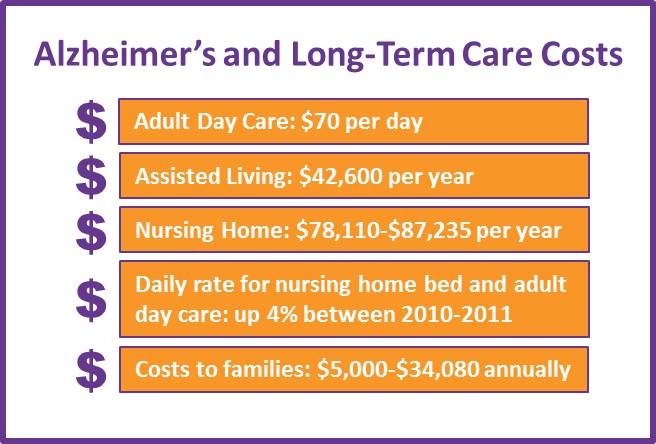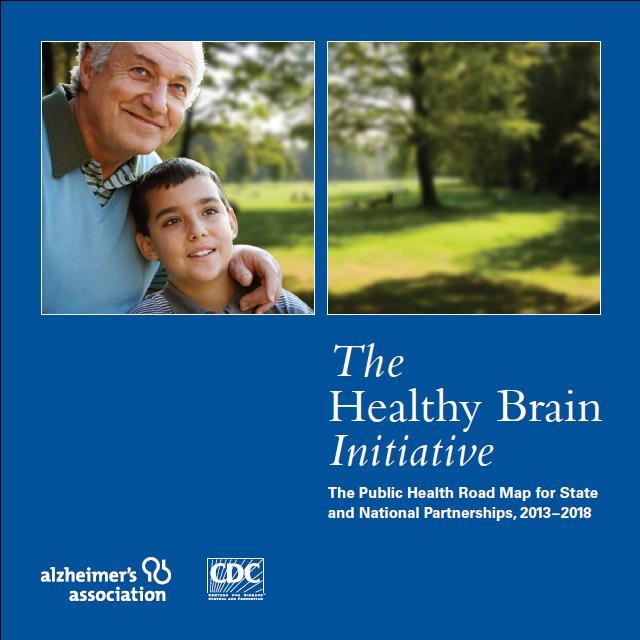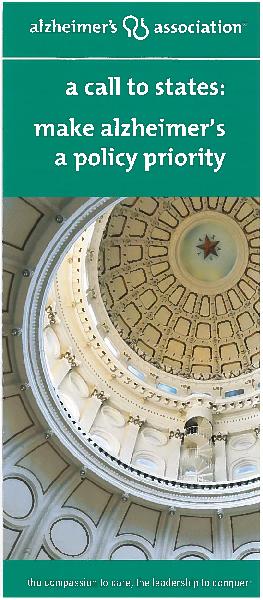|
State Officials Explore the Growing Burden on Long-Term Care and Support Services
 As state agencies work to implement provisions of the Affordable Care Act (ACA), state-level policy associations are hosting forums for lawmakers to discuss implementation issues, the impact on long-term care and support services (LTSS), and the costs of health care. The Alzheimer’s Association has participated in many of these discussions, as individuals with Alzheimer’s and other dementias are significant users of LTSS. Recently, Randi Chapman, Director of State Affairs for the Alzheimer’s Association, delivered a keynote address during the Southeastern Association of Area Agencies on Aging’s Annual Training Conference. Ms. Chapman’s presentation, “The Silent Epidemic Crippling the Long-term Care System,” focused on the rising costs of Alzheimer’s disease and the disease’s burden and impact on LTSS. Ms. Chapman also made a presentation on LTSS and the impact of Alzheimer’s disease within the Latino community, at the National Association of Latino Elected and Appointed Officials’ (NALEO) Policy Institute on The Changing Dynamics of the Latino 50+ Population. As state agencies work to implement provisions of the Affordable Care Act (ACA), state-level policy associations are hosting forums for lawmakers to discuss implementation issues, the impact on long-term care and support services (LTSS), and the costs of health care. The Alzheimer’s Association has participated in many of these discussions, as individuals with Alzheimer’s and other dementias are significant users of LTSS. Recently, Randi Chapman, Director of State Affairs for the Alzheimer’s Association, delivered a keynote address during the Southeastern Association of Area Agencies on Aging’s Annual Training Conference. Ms. Chapman’s presentation, “The Silent Epidemic Crippling the Long-term Care System,” focused on the rising costs of Alzheimer’s disease and the disease’s burden and impact on LTSS. Ms. Chapman also made a presentation on LTSS and the impact of Alzheimer’s disease within the Latino community, at the National Association of Latino Elected and Appointed Officials’ (NALEO) Policy Institute on The Changing Dynamics of the Latino 50+ Population.
Long-term services and supports help individuals accomplish everyday tasks such as bathing, getting dressed, fixing meals, and managing general home life. Alzheimer’s disease, the most common form of dementia, almost always results in a need for LTSS at some point. By 2050, the annual number of new cases of Alzheimer’s is projected to more than double. This has a huge impact on the LTSS system, Medicaid, and state budgets. Average per-person Medicaid spending for seniors with Alzheimer’s disease and other dementias is 19 times higher than average per-person Medicaid spending across all other seniors.
Realizing the growing burden of the disease and the impact of LTSS on state budgets, a federal Commission on Long-Term Care was established to advise Congress on how long-term care can be better provided and financed for the nation's older adults and people with disabilities. The Commission’s recommendations, released on September 18, focus on three key areas: service delivery, workforce, and financing.
Rhode Island's Family Caregiver Bill Proposed for Consideration by Other States

The Council of State Government’s (CSG) Suggested State Legislation Committee recently convened to consider innovative state legislation about topics of current importance to states, to be published in an annual Suggested State Legislation volume.
The Committee voted to include Rhode Island’s recently enacted H 5155, The Family Caregivers Support Act. This law requires the state’s health department to develop evidence-based caregiver assessments and referral tools for family caregivers, and then to use that information to help develop individual plans of care that take into account the needs of the caregiver and the recipient. Lawmakers hope that the assessments will identify specific problems that long-term caregivers or recipients might have, carefully evaluate how those situations should be handled, and identify effective solutions. Information about available respite programs, caregiver training, education programs, support groups and community support services will be included as part of the plan for each family caregiver. Referrals to available resources such as the local Alzheimer’s Association Chapter and the support services the Chapter offers for individuals living with the disease and their family caregivers will be included in the plan of care that is developed.
In 2012, 15.4 million family members and friends provided 17.5 billion hours of unpaid care to people with Alzheimer’s and other dementias, at an economic value of over $216 billion. Those who care for someone with Alzheimer’s or another dementia are 3.5 times more likely than caregivers of people without these conditions to say that the greatest difficulty associated with caregiving is that it creates or aggravates their own health problems. The physical and emotional impact of caregiving on Alzheimer’s and other dementia caregivers resulted in an estimated $9.1 billion in increased caregiver health costs in 2012. Legislation like that passed in Rhode Island will help address the burden faced by Alzheimer’s caregivers.
New Road Map Offers Actions for State and Public Health Officials to Address Cognitive Health
 In July, at the Alzheimer’s Association International Conference (AAIC), the Alzheimer’s Association and the Centers for Disease Control and Prevention’s (CDC) Healthy Aging Program released The Healthy Brain Initiative: The Public Health Road Map for State and National Partnerships, 2013–2018. This Road Map provides specific actions the public health community and partners can take in the fight against Alzheimer’s disease over the next five years. In July, at the Alzheimer’s Association International Conference (AAIC), the Alzheimer’s Association and the Centers for Disease Control and Prevention’s (CDC) Healthy Aging Program released The Healthy Brain Initiative: The Public Health Road Map for State and National Partnerships, 2013–2018. This Road Map provides specific actions the public health community and partners can take in the fight against Alzheimer’s disease over the next five years.
Nearly 300 stakeholders – including researchers, public health officials, content experts, practitioners, and decision makers at the national, state, and local levels – were invited to participate in the development of the Road Map. It is the second in a series of road maps designed to assist the public health community in promoting cognitive functioning, addressing cognitive impairment and Alzheimer’s disease, and helping meet the needs of caregivers. Thirty-five specific action items are included.
The Road Map highlights the importance of addressing Alzheimer’s disease as a public health and state policy issue as well as the need to implement population-based solutions based on the unique needs of each state.
Advocate Impact Spotlight
Scott Russell, Connecticut
 Scott Russell was diagnosed with younger-onset Alzheimer’s disease in 2009, at the age of 60. Having witnessed his father live with and ultimately succumb to Alzheimer’s, Scott realized he needed to use his personal story to raise awareness about the stigma attached to the disease, and the need to aggressively address this disease. Scott has taken his advocacy efforts to the front line. He is an active member of the Alzheimer’s Association Connecticut Chapter’s Public Policy Committee and he also serves as a “State Ambassador” for Connecticut. Scott Russell was diagnosed with younger-onset Alzheimer’s disease in 2009, at the age of 60. Having witnessed his father live with and ultimately succumb to Alzheimer’s, Scott realized he needed to use his personal story to raise awareness about the stigma attached to the disease, and the need to aggressively address this disease. Scott has taken his advocacy efforts to the front line. He is an active member of the Alzheimer’s Association Connecticut Chapter’s Public Policy Committee and he also serves as a “State Ambassador” for Connecticut.
Thanks to the efforts of advocates like Scott, Connecticut recently passed HB 5979, to establish a State Alzheimer’s Disease Task Force, which is currently developing a comprehensive State Alzheimer’s Disease Plan. Scott also served on the Association’s 2011 Early-Stage Advisory Group and is currently an active member of the Association’s National Board of Directors. Scott and his wife, Amy, live in Ridgefield, CT. They have two sons, Joshua, an environmental activist, and Nick, a professional snowboarder. In his spare time, Scott paints and sells stuffed animals called “Alzi Animals,” donating all proceeds to the Alzheimer’s Association. And, he was the inspiration for the children’s book, Silly Mr. Scott. Before his diagnosis, Scott was a Global Senior Human Resources Consultant. He received his master’s degree in international relations from Boston University and his doctoral degree in educational leadership from Fairleigh Dickinson University.
Do you have a constituent who is part of the movement to end Alzheimer’s now? Would you like to honor an advocate in your state by sharing his/her story? If so, please email Jennifer Rosen at jrosen@alz.org to have your constituent’s story considered for the next “Advocate Impact Spotlight.”
|
|
State Policy Priorities
 The Alzheimer’s Association calls on state policymakers to focus on four key policy priorities: State Alzheimer’s Plans, UAGPPJA, dementia training, and data collection. To learn more about state legislation we support, click on the brochure at the left or visit our website. The Alzheimer’s Association calls on state policymakers to focus on four key policy priorities: State Alzheimer’s Plans, UAGPPJA, dementia training, and data collection. To learn more about state legislation we support, click on the brochure at the left or visit our website.
Opportunities to Learn More about Alzheimer’s State Policy
June 12: National Hispanic Caucus of State Legislators' National Summit in Orlando, FL.
November 20-22: National Foundation for Women Legislators’ Capital Forum in Arlington, VA.
December 3-5: 2013 Hawaii HCBS Conference in Honolulu, HI.
Additional Policy Resources
 Council of State Government’s (CSG) Knowledge Center on Dementia. Council of State Government’s (CSG) Knowledge Center on Dementia.
 National Conference of State Legislatures’ (NCSL) Alzheimer’s Disease Resource Center. National Conference of State Legislatures’ (NCSL) Alzheimer’s Disease Resource Center.
 Women in Government (WIG) Alzheimer’s Policy Resource Center Women in Government (WIG) Alzheimer’s Policy Resource Center
Contact
For more information on the Alzheimer’s Association’s state efforts, state policy agenda, or Alzheimer’s disease in general, contact Randi Chapman at rchapman@alz.org.
|

